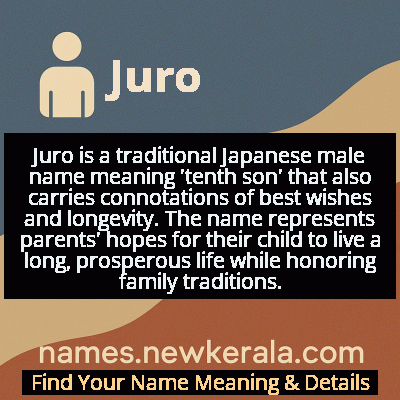Juro Name Meaning & Details
Origin, Popularity, Numerology Analysis & Name Meaning of Juro
Discover the origin, meaning, and cultural significance of the name JURO. Delve into its historical roots and explore the lasting impact it has had on communities and traditions.
Name
Juro
Gender
Male
Origin
Japanese
Lucky Number
1
Meaning of the Name - Juro
Juro is a traditional Japanese male name meaning 'tenth son' that also carries connotations of best wishes and longevity. The name represents parents' hopes for their child to live a long, prosperous life while honoring family traditions.
Juro - Complete Numerology Analysis
Your Numerology Number
Based on Pythagorean Numerology System
Ruling Planet
Sun
Positive Nature
Leaders, ambitious, highly driven, self-reliant, innovative.
Negative Traits
Overly aggressive, domineering, impatient, selfish.
Lucky Colours
Red, orange, gold.
Lucky Days
Sunday.
Lucky Stones
Ruby, garnet.
Harmony Numbers
2, 3, 9.
Best Suited Professions
Entrepreneurs, managers, engineers.
What People Like About You
Courage, determination, leadership.
Famous People Named Juro
Juro Miyake
Film Director
Pioneering Japanese filmmaker known for innovative visual storytelling techniques
Juro Kara
Playwright/Theater Director
Founder of the influential Jokyo Gekijo theater company and major figure in Japanese underground theater
Juro Saito
Ceramic Artist
Renowned potter preserving traditional Japanese ceramic techniques while incorporating modern aesthetics
Juro Tanaka
Business Executive
CEO who transformed a traditional manufacturing company into a global technology leader
Name Variations & International Equivalents
Click on blue names to explore their detailed meanings. Gray names with will be available soon.
Cultural & Historical Significance
The character 郎 has been used in male names since the Heian period (794-1185), originally denoting a young man of samurai class, which adds a layer of historical prestige to the name. During the Edo period, such numerical names became particularly popular among commoners as well, symbolizing both practical family organization and spiritual blessings for the child's future. The name Juro thus represents a fascinating intersection of practical family logistics, cultural symbolism, and aspirational naming practices that have evolved over centuries of Japanese history.
Extended Personality Analysis
Individuals named Juro are often perceived as carrying the weight of family traditions and expectations, which shapes their personality toward responsibility, reliability, and strong family values. The numerical aspect of the name suggests someone who is methodical, organized, and appreciates structure in their life. They tend to be patient and persistent, qualities associated with the 'tenth son' designation implying the ability to wait their turn and work steadily toward goals. The longevity meaning imbues them with a sense of wisdom beyond their years and a calm, measured approach to life's challenges.
These individuals often display remarkable resilience and the ability to navigate complex social situations, perhaps reflecting the experience of growing up in a large family dynamic. They typically value harmony and balance, seeking to maintain peaceful relationships while quietly pursuing their ambitions. The combination of meanings suggests someone who is both practical in their approach to life and deeply spiritual in their outlook, often serving as a stabilizing force in their communities. Their inherent sense of order and tradition makes them excellent at preserving cultural knowledge and maintaining important relationships across generations.
Modern Usage & Popularity
In contemporary Japan, Juro maintains a presence as a traditional yet distinctive choice for boys. While not among the most popular names in recent decades, it enjoys steady usage among families valuing cultural heritage and historical continuity. The name has seen a mild resurgence as part of the 'retro naming' trend, where parents seek names with deep cultural roots and meaningful history. It's particularly favored by families with connections to traditional arts, historical preservation, or those who appreciate the numerical naming system's elegance. Modern usage often emphasizes the 'longevity' and 'best wishes' aspects over the literal 'tenth son' meaning, making it accessible even to first-born children. The name appears across various social strata but maintains a certain sophistication that appeals to educated, culturally-aware parents.
Symbolic & Spiritual Meanings
Symbolically, Juro represents completion, endurance, and the culmination of cycles. The number ten in Japanese culture signifies perfection and wholeness, as seen in the decimal system and traditional counting methods. This makes Juro emblematic of someone who brings matters to completion and maintains balance. The longevity aspect connects to cultural symbols like the crane and turtle, both representing long life in Japanese tradition. The name also carries metaphorical weight as a bridge between generations - honoring ancestral traditions while carrying them forward. In a broader sense, Juro symbolizes the Japanese values of perseverance (gaman), duty (giri), and the importance of family continuity, serving as a living embodiment of cultural heritage and personal resilience.

